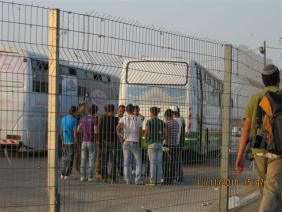Za'tara (Tapuah), Thu 11.11.10, Afternoon
9:15 Za'tara/Tapuah Junction
Sometimes the simplest activity, completely unplanned, defines the entire problem of the occupation. Thursday was the memorial day for Yasser Arafat in Ramallah. There was a lot of traffic going that direction.
We were four people in the car, Nadim, the driver, Tamar, Aliyah and Sami who was going back to As Sawiya after a week of work in Tel Aviv. Nadim and Sami sat in front. As we went around the circle of Za'tara/Tapuah Junction and turned into route 60 toward Ramallah. We saw a young Palestinian woman seeming to have an argument with a soldier standing there. Along the road, on the shoulders, about 10 settlers were standing, waiting for rides. The soldier, with hand gestures, seemed to be telling the woman to go away. Nadim stopped the car and called out to the woman to ask what the problem was. She answered and then both Nadim and Sami argued with the soldier to let her go. He answered that those were his orders. Both Sami and Nadim were angry; Tamar and I couldn't figure out what was going on.
Nadim drove the car past the settlers and onto the shoulder of the road. He and Sami jumped out and ran back to the woman. Before we could even see what was going on a Palestinian taxi pulled up in front of Nadim's car. Then Nadim and Sami appeared with the woman who got into the taxi which drove off in the direction of Ramallah. Then Nadim and Sami were free to explain what had happened.
The young woman was on her way to work in Ramallah and wished to wait for a taxi. All she wanted to do was to walk along the edge of the road, past the settlers so that a taxi could stop for her. But the soldier wouldn't hear such a thing. He was telling her she had to walk out into the road in order not to walk too close to the settlers - many of them armed. She was arguing that it was too dangerous for her in the road as drivers couldn't see her until after they turned. He would not allow her to get near the settlers. His orders! Nadim and Sami escorted her to the taxi (of course, over the protest of the soldier) that had appeared just then. It seems that everyday a soldier stands there and makes the Palestinians walk around, not next to the settlers. We're so happy to say that the soldier and settlers were all safe and sound!
As Sawiya
In As Sawiya we interviewed Abed, Sami's brother.
The incident of the fire that was deliberately started at the girl's secondary school which serves the villages of As-Sawiya and Al-Lubban Ash-Sharkiya has been reported on by MachsomWatch women. The incident took place on the night of October 25, when settlers came down to the main road, no. 60, where the school is situated, separate and at some distance from the two villages. Inside the wall around the yard and the school the vandals managed to ignite a storage shed for books and other materials, and damaged the water pipe and the main door. There are also signs of the fire outside the walls. The settlements of Eli, Shilo and Maaleh-Levonah look down on the two Palestinian villages from the hills on both sides of the main road. The day following the fire incident a huge sign was evident on the hill by Eli, "Shalom m'noar hagvaot" - "Hi from the hilltop youths". The army and the civil administration made a short investigation after which they offered the villages an apology. The girls at the school feel confused and not safe, and exposed to settler violence. Israeli activists should be aware that such brutality is an effective tool to damage Israel's reputation in the world.
made a short investigation after which they offered the villages an apology. The girls at the school feel confused and not safe, and exposed to settler violence. Israeli activists should be aware that such brutality is an effective tool to damage Israel's reputation in the world.
Three years ago Abed's nephew, Yazzan, who was standing at the side of the road, was deliberately run over and killed by a settler. This was in revenge for having once had stones thrown at him and his son who was injured. The settler got one year in prison. The father is now a member of the Bereaved Parent's Forum.
Once As-Sawiya was a main supplier of figs in Palestine, but the fig groves are on the slopes by Eli and the farmers can only get to them during the harvest season - by permit. This doesn't allow for proper care of the groves and the crop is almost gone. In addition the sewage water from Eli runs freely down the slope and into the olive and fig groves, poisoning the trees and killing them. There is also a small spring of water, Rahawat, which has been polluted by the sewage from Eli. During the fig harvest in August, and the olive harvest in October-November the settlers surround the pickers and are very threatening.
That day was the yearly memorial for Arafat in Ramallah. Thousands visit his gravesite, and there is a whole day of festivities. Later there is a march through the city and in the evening a concert at the Cultural Palace. This to show respect for the memory of Arafat.
All the time we were talking Sami's two young children were playing around us. His son is three years old and we asked about a nursery school for the young children. It seems that there is one in the village but there is no bus service. The parents have been promised a pick-up service starting in the winter. Then all the young children will be able to attend the nursery school.
